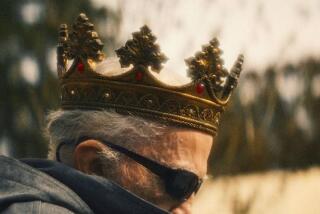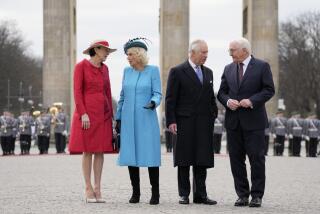Pray Thee, Play!
- Share via
KALTENBERG, Germany — From Paris to Phnom Penh, the world’s 40-odd dispossessed royal families remain intriguing, sometimes potent vestiges of a bygone age. Some monarchs hold court in exile, others play at intrigue or deign to dabble in modern electoral politics.
Here in peaceful Bavaria, the man who would be king--if this southern German state were still a kingdom--uniquely fulfills his regal identity by reenacting, for three weekends each summer, some of the most startling sights and sensations of the late Middle Ages, at the family Schloss, or castle.
On July 3 to 5, 10 to 12 and 17 to 19 of this year, this tiny farming village, 30 miles west of Munich, will fling itself back 500 years in time, and bustle again with jesters and jugglers, falconers and fencers, blaring trumpets, fluttering pennants and brawny blacksmiths in leather jerkins hammering out complete suits of armor. For nine days, the Middle Ages will not wane but wax in Kaltenberg.
Lords and ladies will promenade in outlandish silken finery, while giggling wenches tar and feather the bare nates of yoked criminals who can’t get enough of their punishment.
There will be much period music, food and beer, but the best part, each afternoon, will be a jousting tournament, with armored riders sending each other flying from the saddle at lance-point. There will be flaming arrows and catapults, and maybe, just maybe, someone will seemingly be run through while scaling the ramparts.
True, you can catch a gimcrack “Renaissance Faire” at your local shopping mall--but where else but Kaltenberg can you indulge your medieval fantasies in the shadow of a castle dating back to 1290?
Where else can you look on as skilled ruffians--their timing necessarily every bit as good as Tara Lipinski’s--have at each other with real axes and maces (clubs with spikes)?
Where else can you sit high above an arena crowded with knights and damsels, Bierstein and salted radish slices in hand, and be welcomed by His Royal Highness, Prince Luitpold of Bavaria--and know that his majesty is a real, paid-up throneless royal, who has ponied up $2 million for your amusement and instruction?
“I think we’re all living in an over-technologized world, a virtual world,” says Prince Luitpold, the history-loving creator of the Kaltenberg Ritterturnier or Kaltenberg Knights’ Tournament.
The 46-year-old prince himself goes in for horsemanship--he participates in national equestrian events--and is a moderate royalist, who dares to say, “It’s debatable whether democratic principles are more protected in a monarchy or a republic.” He is a bitter enemy of such present-day entertainments as the video game, which he detests because an electronic victory means total annihilation of the enemy.
How much better, he thinks, how much more noble and civilized, were the ritual combats of medieval times, before the arrival in Europe of gunpowder.
“In any research on behavior, you’ll find that the human being has a psychological barrier against killing,” he says. “But as soon as you have a gun, that barrier doesn’t work any more. You are too far away from your opponent, and you don’t have any sense of his pain. This is very different from fighting man-to-man.”
Prince Luitpold, alas, is all too familiar with the wantonness and inhumanity of the gun-packing 20th century. He is of the House of Wittelsbach, which ruled Bavaria from 1180 to 1918, when the monarchy was abolished. (The Wittelsbachs never abdicated, however.) The family was ravaged by the Nazis during the Third Reich; one crown prince died as a result of medical experimentation in a concentration camp.
Today, the Wittelsbachs must work for a living, and Prince Luitpold has gone into beer. His Royal Highness receives visitors, dressed in a cardigan, , in the conference room of his small brewery in the nearby small town of Geltendorf, where the walls are decorated with ornate beer steins and a baleful portrait of his most famous ancestor, King Ludwig II, Bavaria’s eccentric builder of fairy-tale castles. Prince Luitpold operates a second microbrewery, and restaurant, in the family castle in Kaltenberg.
*
More than two decades ago, Prince Luitpold recalls, he happened upon a tournament being staged by British medievalists near the Tower of London. The prince knew something of the promotional value of festivals--Munich’s renowned, monstrously crowded Oktoberfest started as a wedding party for his great-great-great grandfather, Ludwig I.
Prince Luitpold, ironically, isn’t allowed to sell his beer at Oktoberfest because he brews it outside the Munich city limits. It occurred to him that an elaborate medieval festival here in Kaltenberg might be a good gimmick for his own label.
“The idea was to get Kaltenberg on the map,” he says.
As it turned out, the prince’s sense of the moment was perfect. Germany, on the whole, has been a nation slow to wallow in its history with the kind of pageants and “Renaissance Faires” now thrown up in great numbers in America, Britain and other parts of Europe. So much of the national history is blood-soaked and repellent that many consider it politically incorrect even to glue together a World War I model biplane. Forget about shaving your head, brandishing a cudgel, and seeking self-expression through recourse to an era over-provided with wars, famines and pestilence.
But tradition-loving Bavarians tend not to be so reticent, and Prince Luitpold was first into a receptive local market. Today, 18 years later, many more Germans have come to embrace the idea of medieval fairs, and the Kaltenberg Knights’ Tournament is billed as “the biggest knights’ tournament in the world.”
Each summer’s reenactment involves about 1,200 handsomely paid circus performers, actors and stuntmen from all over Europe, along with seven or eight musical groups schooled in the playing of period instruments. Local restaurateurs light fires and roast game outdoors, or simmer stew in huge caldrons. Many of the 100,000 visitors who attend each year dress in medieval garb themselves.
“It’s hard to tell the spectators from the tournament participants,” Prince Luitpold says.
*
The village of Kaltenberg itself has only about 600 inhabitants and may not even rate a dot on a German map. Most festival-goers who elect to drive from Munich to Kaltenberg (as opposed to taking the S-Bahn) shoot for Geltendorf, about 30 miles west of Munich. Once there, they look for the small roadside signs to nearby Kaltenberg that the Ritterturnier organizers set up in season. On the approach to Kaltenberg, one soon meets parking attendants.
While waiting for the afternoon’s jousting to start, you can inspect the Schloss, which is not a castle in the turrets-and-crenelations mode, but something more like a medieval manor.
Since the prince and his family live in the castle and want to maintain the privacy of their living quarters, there aren’t any tours of the interior. But one can walk around the courtyard and the grounds and go into the restaurant for a meal.
In the courtyard, and up and down the village lanes outside, are costumed artisans turning out everything from hand-braided ropes to illuminated manuscripts. There are ladies with lace-up bodices and flowered wreaths selling Wurst, moonshiners in Lederhosen offering Schnapps straight from the still, pardoners hawking letters of indulgence. You can buy your very own mace, chastity belt, jester’s bells, custom-fitted suit of plate-armor--or just a simple wooden sword and shield for your child.
The prince also wages war on commercial junk food.
“No hot dogs!” he says. “No pommes frites. No chewing gum. No Popsicles. We’re constantly fighting with people on the restaurant side not to sell things that don’t fit in a medieval atmosphere.”
Thus you can dine on such traditional regional fare as Kasespatzle--Bavaria’s heartburn-inducing answer to macaroni and cheese--or smoked fish, or lean pork roasted over wood fires by Kaltenberg’s restaurateurs. And more substantial sit-down meals can be had in the festival’s “Noble Tent,” a large, castle-shaped tent set up behind the medieval crafts market.
And since this is, after all, a beer festival, the output of Prince Luitpold’s brewery is on offer everywhere, in commemorative mugs.
*
Three cannon blasts announce the beginning of the Ritterturnier in the early afternoon. The show unfolds along a cornball dramatic line, favoring such medievalist set pieces as a peasant revolt, the usurpation of a child heir to the throne by a wicked uncle, or a knight doing lifelong penance for the crime of dropping his lady’s scarf. An announcer gives an account of the action, which will be more or less incomprehensible to the non-German-speaking visitor.
This matters little. What’s fun to do now is sit back with your beer in the terraces, and watch the stuntmen stage a ritual fight to the finish. They ride like rodeo stars, starting with a competition to lance rings held aloft by “squires,” then hurling javelins at targets, all at full gallop.
Next they race their horses (legs protectively moistened) through a “wall of fire” created by burning hay. Finally, they turn their lances on each other.
The javelins and lances are of soft wood, and Prince Luitpold says that in 18 years, the only first aid he has had to administer has been a few stitches. The armor, he says, is well-padded inside.
If you have children along, so much the better, for when the day’s tournament ends, the stuntmen and horses clear out of the arena. Then, all the kids in the audience rush the sand and stage their own tournament. “I’m always fascinated when the tournament is over,” says Prince Luitpold. “You suddenly have 500 kids going into the ring with wooden swords, and they stage a perfect sword fight. One will hit and the other will defend, and they will not hurt each other. They very quickly pick their heroes. They want to show their best side, and they don’t want to destroy each other.”
(BEGIN TEXT OF INFOBOX / INFOGRAPHIC)
GUIDEBOOK
Back in Bavaria
Getting there: United and Lufthansa offer connecting service from L.A. to Munich. Current fare is $660 including tax.
You can travel to the Ritterturnier on Munich’s inexpensive light-rail system, or S-Bahn. At the airport, buy a ticket from a Fahrkarten Automat and cancel it yourself in one of the time clocks on the S-Bahn stop platform. (Roving police check tickets at random.) Take the S-8 into Munich and get off at the main train station (Hauptbahnhof). Change to the S-4 line to Geltendorf. Get off at Geltendorf and take the Ritterturnier shuttle bus (provided on festival days) to Kaltenberg.
The Ritterturnier: Entrance to the fairgrounds costs about $14 for adults, $8.50 for children. This price also entitles you to stand above the jousting arena and watch the tournament from a distance. I recommend paying for arena seats for better viewing. The best seats are low in the stands at the sides, about $33 for adults or $27 for children 6 to 16. For reservations, write to the Ritterturnier Kaltenberg GmbH, Schloss-Str. 8, 82269 Kaltenberg, Germany; telephone 011-49-8193-933-100, fax O11-49-8193-933-150.
Where to stay: While I have not stayed at any of these, I have found Bavarian guest houses to be generally clean and safe.
The closest lodgings are at the Gasthof Drexl in Tuerkenfeld, which has double rooms for about $45 per night; tel. 011-49-8193-2-51.
In Schondorf, the Gasthof Drexl (tel. 011-49-8192-2-86) has double rooms for about $47, and the Gasthof Ammersee (tel. 011-49-8192-14-00) has double rooms for about $50.
In Landsberg the Hotel Ramada has double rooms for $110 per night; tel. 011-49-8191-92-90-0, fax 011-49-8191-929-0444. All prices include breakfast.
For more hotels, contact the Tourismusverband Ammersee-Lech e.V., Von Kuehlmann-Str. 15, 86899 Landsberg am Lech, Germany; tel. 011-49-8191-47-177, fax 011-49-8191-12-94-50.
For more information: German National Tourist Office, 11766 Wilshire Blvd., Suite 750, L.A., CA 90025; tel. (310) 575-9799.
More to Read
Sign up for The Wild
We’ll help you find the best places to hike, bike and run, as well as the perfect silent spots for meditation and yoga.
You may occasionally receive promotional content from the Los Angeles Times.






